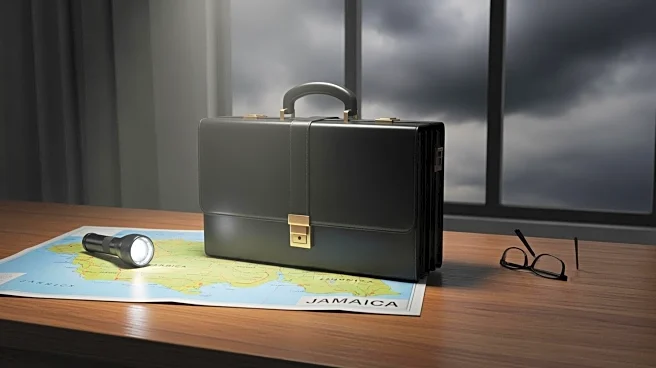What's Happening?
Michelle Robinson, a New York-born attorney with law offices in Brooklyn and Kingston, Jamaica, is preparing for the impact of Hurricane Melissa, which is forecasted to strengthen into a Category 5 storm.
Robinson, who has family on the island, has decided to stay and ride out the storm, despite the potential for catastrophic flooding and power outages. She has stocked up on essentials like flashlights, food, and water, but is concerned about the inability to cook if the electricity fails. The National Hurricane Center has warned that Melissa is moving slowly, increasing the risk of prolonged damage. The storm has already caused fatalities in the Dominican Republic and Haiti, and Jamaican authorities are urging evacuations in high-risk areas.
Why It's Important?
Hurricane Melissa poses a significant threat to Jamaica, with potential widespread destruction due to its strength and slow movement. The impact on infrastructure, such as power and housing, could be severe, affecting thousands of residents and businesses. The situation highlights the challenges faced by island nations during hurricane season, including the need for effective disaster preparedness and response strategies. The storm's progression is being closely monitored by meteorologists, who are concerned about the accuracy of predictions due to budget cuts affecting forecasting capabilities. The broader implications include potential disruptions to local economies and the need for international aid and support in the aftermath.
What's Next?
As Hurricane Melissa approaches, Jamaican authorities continue to urge residents in high-risk areas to evacuate, although compliance is mixed. The focus will be on emergency response and recovery efforts once the storm passes, with potential international assistance required to address the aftermath. Meteorologists will be analyzing the storm's impact to improve future forecasting and preparedness strategies. The situation may also prompt discussions on climate change and its role in intensifying weather events, as well as the need for sustainable infrastructure development in vulnerable regions.
Beyond the Headlines
The situation in Jamaica underscores the ethical and logistical challenges of disaster management in regions prone to severe weather. The decision by some residents to stay despite evacuation orders raises questions about personal risk assessment and the adequacy of government communication and support. Long-term, the event may influence policy discussions on climate resilience and the allocation of resources for disaster preparedness, particularly in economically disadvantaged areas.









